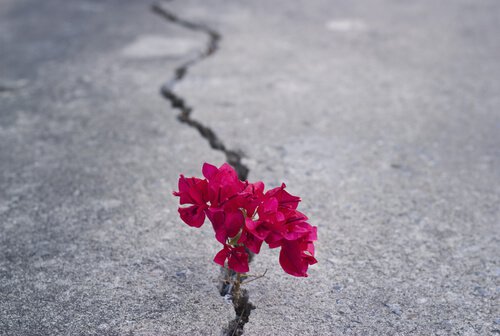8 Characteristics of Resilient People

The Swiss writer Herman Hesse once wrote, “Soft is stronger than hard; water is stronger than rock, love is stronger than violence.” Why would he think that something soft turns out to be stronger or tougher than something that appears to be hard or rigid? If we were to carefully analyze this quote we could conclude that he was referring to resilience.
Resilience is the capacity we all have to adapt and cope with unfavorable situations. It is a concept well known in psychology but less often explored by human beings in general.
Resilience is a tool that all living beings have at their disposal but in different ways. It is a key with which we can cope and survive the bad times. It’s that wonderful adaptation that allows our “emotional rope” to be stretched thin, but never split.
However, it seems that there are people that find it to be less difficult to resist or face bad times. Or perhaps the effort is the same, but the attitude they have is different.
Resilience is part of a complex mechanism that is influenced by many other factors such as the attitude we have towards a problem. Perhaps because of this, some people seem to deal with unpleasant situations differently or with more ease.

After various modern psychology studies, the conclusion was drawn that these are the characteristics of resilient people:
1. They are able to detect the cause of their problems
Resilient people carry out the strategies needed to prevent the problematic situation from happening again. This also implies self-analysis, which is sometimes triggered by a conflict that does not come from the outside, but from within.
2. They know how to handle their emotions
Resilient people are able to manage their thoughts, since any emotion comes from here. We think, then we feel. Resilient people control their thoughts so they are not swayed by those with a negative charge.
3. They keep calm in stressful situations
We all go through difficult times throughout our lives and it is important to know how to stay calm when they occur. Resilient people are able to stay focused and calm in situations of chaos and momentary confusion.
4. They are realistic
There has been a lot of (and negative) talk about optimism which generated the global idea that being positive means to deny certain aspects of reality that are inevitable and present in the lives of many people.
Being realistic but always hoping for the best is the best way to describe the optimistic characteristic of resilient people.
5. They trust themselves
Resilient people have confidence in their worth and competence to overcome adversity. What we say is what ends up forming our reality, so if we think we are not able to overcome an obstacle, of course we won’t be able to.

6. They are empathetic
People with greater capacity to address problems in the right way read the emotions of others, understand what is happening around them and act accordingly.
7. They are able to motivate themselves
Not all people are equal. Some challenges motivate us and others are opportunities for change.
Resilient people know how to seek new ways of satisfaction from life. They are always highly motivated and are able to detect and attract positive things into their lives.
8. They don’t ask why, they ask how
One of the key characteristics of people who tend to easily collapse when facing a problem is that they are driven by thoughts of blame. They constantly question why the negative situation that distresses them has happened to them.
They focus on the why, unlike resilient people, who use their energy to understand how they can manage or get out of the conflicting situation.
If after reading these characteristics of resilient people you still don’t think that you are one of them, it is important that you realize that resilience is present in all people.
The difference between those that are more resilient and those who are less may be in key aspects of how the person is and how they put it into action.
If you start looking at things from another perspective, your problems will begin to appear less like a drama and more like challenges, which depending on the circumstances, you may even start to enjoy.
What’s the key? Your will to change.
The Swiss writer Herman Hesse once wrote, “Soft is stronger than hard; water is stronger than rock, love is stronger than violence.” Why would he think that something soft turns out to be stronger or tougher than something that appears to be hard or rigid? If we were to carefully analyze this quote we could conclude that he was referring to resilience.
Resilience is the capacity we all have to adapt and cope with unfavorable situations. It is a concept well known in psychology but less often explored by human beings in general.
Resilience is a tool that all living beings have at their disposal but in different ways. It is a key with which we can cope and survive the bad times. It’s that wonderful adaptation that allows our “emotional rope” to be stretched thin, but never split.
However, it seems that there are people that find it to be less difficult to resist or face bad times. Or perhaps the effort is the same, but the attitude they have is different.
Resilience is part of a complex mechanism that is influenced by many other factors such as the attitude we have towards a problem. Perhaps because of this, some people seem to deal with unpleasant situations differently or with more ease.

After various modern psychology studies, the conclusion was drawn that these are the characteristics of resilient people:
1. They are able to detect the cause of their problems
Resilient people carry out the strategies needed to prevent the problematic situation from happening again. This also implies self-analysis, which is sometimes triggered by a conflict that does not come from the outside, but from within.
2. They know how to handle their emotions
Resilient people are able to manage their thoughts, since any emotion comes from here. We think, then we feel. Resilient people control their thoughts so they are not swayed by those with a negative charge.
3. They keep calm in stressful situations
We all go through difficult times throughout our lives and it is important to know how to stay calm when they occur. Resilient people are able to stay focused and calm in situations of chaos and momentary confusion.
4. They are realistic
There has been a lot of (and negative) talk about optimism which generated the global idea that being positive means to deny certain aspects of reality that are inevitable and present in the lives of many people.
Being realistic but always hoping for the best is the best way to describe the optimistic characteristic of resilient people.
5. They trust themselves
Resilient people have confidence in their worth and competence to overcome adversity. What we say is what ends up forming our reality, so if we think we are not able to overcome an obstacle, of course we won’t be able to.

6. They are empathetic
People with greater capacity to address problems in the right way read the emotions of others, understand what is happening around them and act accordingly.
7. They are able to motivate themselves
Not all people are equal. Some challenges motivate us and others are opportunities for change.
Resilient people know how to seek new ways of satisfaction from life. They are always highly motivated and are able to detect and attract positive things into their lives.
8. They don’t ask why, they ask how
One of the key characteristics of people who tend to easily collapse when facing a problem is that they are driven by thoughts of blame. They constantly question why the negative situation that distresses them has happened to them.
They focus on the why, unlike resilient people, who use their energy to understand how they can manage or get out of the conflicting situation.
If after reading these characteristics of resilient people you still don’t think that you are one of them, it is important that you realize that resilience is present in all people.
The difference between those that are more resilient and those who are less may be in key aspects of how the person is and how they put it into action.
If you start looking at things from another perspective, your problems will begin to appear less like a drama and more like challenges, which depending on the circumstances, you may even start to enjoy.
What’s the key? Your will to change.
This text is provided for informational purposes only and does not replace consultation with a professional. If in doubt, consult your specialist.







